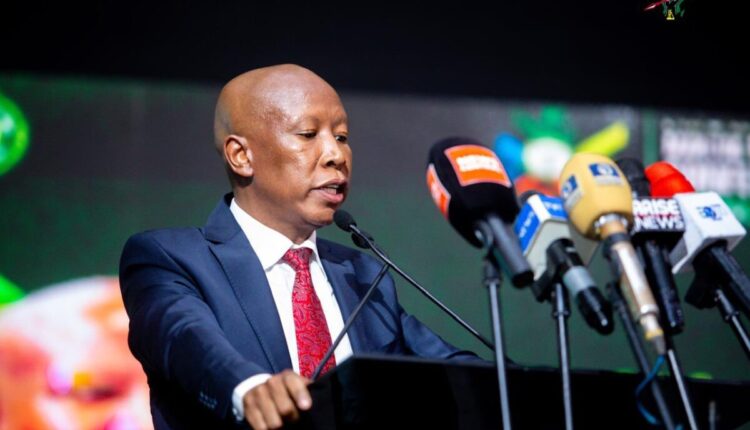South African opposition leader and founder of the Economic Freedom Fighters (EFF), Julius Malema, has hailed Nigeria’s unwavering contributions to the fight against apartheid, describing the country as a pillar of support during South Africa’s darkest period.
Malema, who spoke on Sunday evening at the opening of the 2025 Annual General Conference of the Nigerian Bar Association (NBA) in Enugu, also condemned xenophobic attacks in South Africa, calling them “a betrayal of African unity.”
He said Nigeria stood firmly by South Africa at a time when its people were imprisoned, murdered, and stripped of their basic humanity.
“I must reiterate once again that it is a deep honour to stand before you today in Enugu State in Nigeria, a country that holds a special place in the hearts of all South Africans,” Malema said. “We understand history, feel solidarity and appreciate the sacrifice made by others in the course of our history. Nigeria is not just another African country to us.”
He recalled that Nigeria created the Southern African Relief Fund, mobilising citizens to donate directly from their salaries to support the liberation struggle. According to him, Nigerian students also paid the “Mandela Tax” to fund the education of Black South Africans.
“Even as it faced its own challenges at home, these initiatives raised millions of dollars to support the liberation of South Africa,” he said.
Malema further noted that successive Nigerian governments offered both material and moral support, including boycotting the 1976 Olympic Games and the 1979 Convention of the Multiculturalists.
“We can neither forget all those who stood by us during difficult times, nor can we forget that when Nelson Mandela was released from prison in 1990, one of his earliest international visits was Lagos and Abuja to personally thank the Nigerian people,” he said.
The EFF leader stressed that this bond, sealed in “blood and sacrifice,” should not be left in the past but carried forward into economic cooperation between the two countries. He identified mining, oil and gas, infrastructure, agriculture, and renewable energy as areas of partnership.
“Together, we hold the keys to Africa’s industrialisation and economic independence when we consider what lies beneath our soils,” he declared.
Malema, however, lamented that both countries remain trapped in neo-colonial economic arrangements where raw materials are exported cheaply and imported back at exorbitant prices.
He urged both governments to build factories and process resources locally, envisioning collaborations that combine South African mining expertise with Nigeria’s oil wealth, as well as agricultural partnerships supported by South African technology.
Malema acknowledged the progress of South African companies such as MTN, SPAR, and Multichoice in Nigeria, while also recognising the influence of Nigerian music, films, and literature in South Africa.
Despite these exchanges, he decried the uneven nature of cooperation, citing incidents of xenophobic violence.
“Xenophobia is a betrayal of African unity and a sickness born of poverty,” Malema warned, insisting that true African solidarity requires mutual respect and collaboration.



[…] African political activist and leader of the Economic Freedom Fighters (EFF), Mr Julius Malema, has called on African nations to unite against external forces seeking to […]
[…] Nigerian Meteorological Agency (NiMet) has forecast widespread rainfall and thunderstorms across the country between Monday and Wednesday, warning of possible flash floods in several […]